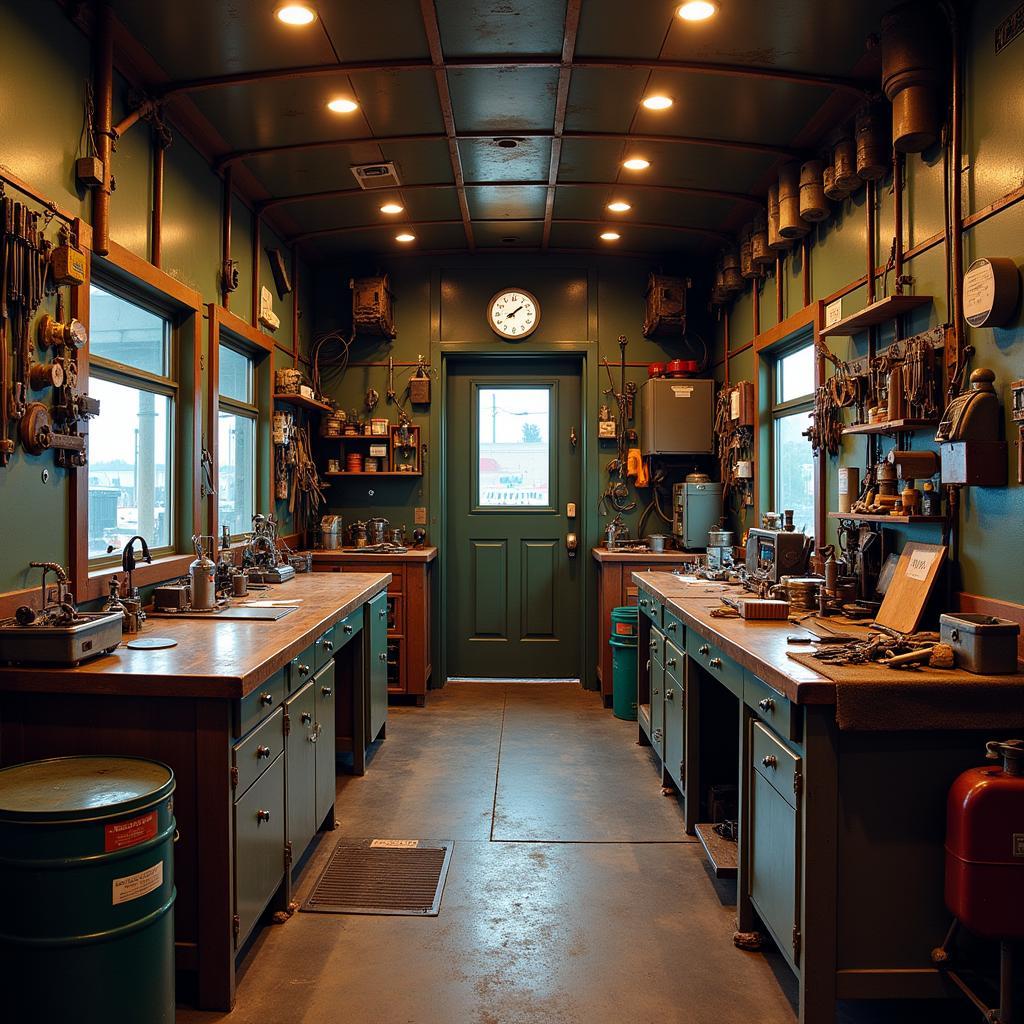Railroad Tool Cars are specialized rolling stock equipped with a variety of tools and equipment essential for maintaining and repairing railway tracks. They serve as mobile workshops, bringing necessary resources directly to the worksite, increasing efficiency and minimizing downtime.
Understanding the Importance of the Railroad Tool Car
Maintaining a vast network of railway tracks requires specialized equipment and efficient logistics. Railroad tool cars are a critical component of this process, providing a mobile platform for a wide array of tasks, from routine inspections to emergency repairs. These cars are designed to carry everything from hand tools and power equipment to heavy machinery and spare parts. This ensures crews have everything they need, right where they need it. They significantly reduce the time and effort required to transport tools and materials to remote locations, increasing overall productivity and minimizing disruption to rail traffic. Imagine trying to transport a heavy-duty rail saw hundreds of miles by truck; a railroad tool car simplifies this process immensely. For enthusiasts, understanding the role of these cars provides a deeper appreciation of the complex logistics involved in railroad operations. Check out more about railroad car maintenance tools.
Types of Railroad Tool Cars
There are several types of railroad tool cars, each designed for specific tasks and equipped with specialized tools:
- Track Geometry Cars: These cars are equipped with sophisticated measuring instruments to assess track alignment, gauge, and other critical parameters. They are essential for preventative maintenance and ensuring the safety and efficiency of rail operations.
- Work Train Cars: These cars carry a wide array of tools and equipment for general track maintenance, including rail saws, grinders, drills, and welding equipment. They often have cranes or other lifting devices for handling heavy materials.
- Supply Cars: These cars primarily carry materials like rails, ties, ballast, and other supplies needed for track repair and construction. They are often coupled with work train cars to provide a complete mobile workshop.
- Specialized Tool Cars: Some railroads operate specialized tool cars for specific tasks, such as rail welding, ballast cleaning, or vegetation control. These cars are outfitted with specialized machinery and equipment for their designated purpose. You can find more information on this at our train car heavy machinery tools page.
 Interior Railroad Tool Car Workshop
Interior Railroad Tool Car Workshop
What Tools are Found on a Railroad Tool Car?
The specific tools and equipment found on a railroad tool car vary depending on its purpose and the railroad’s needs. However, some common items include:
- Hand Tools: Wrenches, hammers, screwdrivers, pliers, and other essential hand tools are always on board.
- Power Tools: Drills, saws, grinders, impact wrenches, and other power tools are essential for various tasks.
- Hydraulic Equipment: Hydraulic jacks, presses, and other equipment are used for lifting and moving heavy components.
- Welding Equipment: Welding machines and related supplies are essential for repairing and joining rails.
- Measuring Instruments: Levels, tapes, gauges, and other measuring instruments are crucial for ensuring accurate track alignment and geometry. Learn more about the diagnostic tools at car diagnostic tool oreillys.
The Evolution of Railroad Tool Cars
Railroad tool cars have evolved significantly over time, reflecting advancements in technology and the increasing demands of modern rail operations. Early tool cars were often simple flatcars or gondolas outfitted with basic tools and equipment. Today, they are sophisticated mobile workshops equipped with advanced machinery, climate control, and even onboard computer systems.
“The evolution of the railroad tool car mirrors the evolution of the railroad itself,” says John Smith, a veteran railroad engineer with over 30 years of experience. “From basic hand tools to sophisticated machinery, these cars have always played a crucial role in keeping the trains running.”
Railroad Tool Car Maintenance and Safety
Proper maintenance of railroad tool cars is essential for ensuring their reliability and longevity. Regular inspections, lubrication, and repairs are necessary to keep the equipment in optimal working condition. Safety is paramount in railroad operations, and strict safety protocols must be followed when working with and around railroad tool cars.
“Safety is always the top priority,” emphasizes Maria Garcia, a railroad safety expert. “Proper training and adherence to safety procedures are crucial for preventing accidents and ensuring the well-being of everyone involved.” Take a look at the fort wayne railroad historical society tool car for more historical context.
Conclusion
Railroad tool cars are indispensable assets for maintaining and repairing the extensive network of railway tracks that crisscross the globe. These mobile workshops ensure that crews have the necessary tools and equipment readily available, enabling them to perform a wide range of tasks efficiently and effectively. From routine maintenance to emergency repairs, railroad tool cars play a vital role in keeping trains running smoothly and safely. Consider checking out american car & foundry co brass tool badges for more related information.
FAQ
- What is the primary function of a railroad tool car?
- What types of tools are typically found on a railroad tool car?
- How have railroad tool cars evolved over time?
- Why is regular maintenance of railroad tool cars important?
- What safety precautions should be observed when working with railroad tool cars?
- Where can I find more information about historical railroad tool cars?
- What are some of the specialized tools used in modern track maintenance?
For any inquiries or assistance with car diagnostics, please contact us via WhatsApp: +1(641)206-8880, Email: [email protected] or visit our office at 910 Cedar Lane, Chicago, IL 60605, USA. Our customer service team is available 24/7.

Leave a Reply